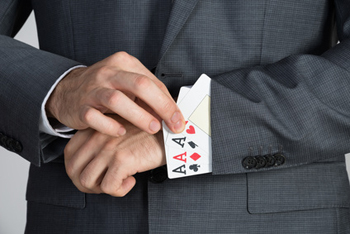
Probably magic!
Why are we surprised when a magician correctly guesses cards picked from a deck, as in the trick shown in the video? Is it really that difficult to perform such a trick, or could it just be down to chance?
The answer is most probably not, as the probabilities are vanishingly small. In this article we will do the basic calculations and we'll also show that whenever you shuffle a deck of cards you make history: chances are you produce an order of cards that has never ever occurred before in the whole, long history of the Universe.
Picking cards
A deck of cards has 52 cards, divided into four suits, two red — hearts and diamonds — and two black – clubs and spades. Each suit has 13 cards: Ace, 2, 3, 4, 5, 6, 7, 8, 9, 10, J, Q, K.
If you choose a card at random, there are 52 possibilities for what you might get. So, if a magician were to simply guess what card you have picked, there would be a chance of only 1/52 they guess it correctly, or a little less than 2%. That means that if a fake magician repeats the same guessing trick around 100 times, they would be expected to guess correctly only twice. The audience would be quite frustrated by the other attempts!
What's the probability of guessing two cards correctly? The chance of guessing the first card correctly is 1/52, as we have just seen. Then, after the first card has been picked, there are only 51 cards left for the second guess. The probability of correctly guessing the second card is therefore 1/51. Hence, the probability of correctly guessing two cards in a row is:
1/52 x 1/51 = 1/2652 ≈ 0.0004,
so guessing two cards correctly is a much more impressive trick.
This is the multiplication principle: the probability of two independent events (guessing two cards correctly) is the product of the two individual probabilities.
Similarly, the probability of correctly guessing three cards in a row, as in the video, is:
1/52 x 1/51 x 1/50 = 1/132600 ≈ 000000.8.
Counting combinations
The multiplication principle gives us the probabilities we are after because it counts how many possibilities there are: when picking three cards there are 52 possibilities for what the first one might be, 51 for what the second one might be, and 50 for what the third one might be. This gives a total of 52 x 51 x 50 possible three-card combinations, which means that the probability of picking one of them is
1/52 x 1/51 x 1/50.
Now imagine you have a whole deck of cards. Take the deck of cards and shuffle it several times (how many times can be considered "several times"?). Hold it in front of you and ask yourself:
Is it the first time ever in history that the cards are displayed in this exact order?

Trick or chance?
Unfortunately, there is no way that you could guarantee the answer. However, chances are that you are holding a never-ever-made sequence. Pretty amazing, huh? How can we say this?
First, consider the same technique we used to calculate how many three-card combinations there are. There are 52 cards to fill in a sequence of 52 spots for cards. There are 52 possibilities for the first spot, 51 for the second (once the first spot is filled), and so on. Hence the total number is:
52 x 51 x 50 x 49 ... x 2 x 1 = 8.07 x 10 67.
If we were to write this number out in full, it would have 68 digits.
The chance of producing the order you have produced by your shuffling is therefore
1/(8.07 x 10 67).
This is an incredibly small probability. To show just how small it is, let's make our own metaphor. According to the Big Bang theory, the whole Universe was created about 13.7 billion years ago. Also, as of right now, population of Earth is 7.5 billion people.
Now imagine a parallel world with 10 billion people who all live forever. Give one deck of cards to each person (it doesn't matter if the person is a newborn or elderly) and ask them to shuffle once per second for the next 14 billion years. Also, consider that each year is a leap year (366 days). Further, assume that for every shuffle a completely new sequence of cards is created. How many new combinations would be created in this process?
Let's break the problem down into steps. After the first second, there would be 10 billion (1010) new combinations: one for each of the 10 billion people who are shuffling. After the first minute, there would be 10 billion times 60 new combinations, that's 1010 x 60 = 6 x 1011. We can continue like this:
| After first... | Number of combinations |
|---|---|
| Second: | 1010 |
| Minute: | 6 x 1011 |
| Hour: | 6 x 1011 x 60 = 3.6 x 1013 |
| Day: | 3.6 x 1013 x 24 = 8.64 x 1014 |
| Year: | 8.64 x 1014 x 366 ≈ 3.16 x 1017 |
| 14 billion years: | 3.16 x 1017 x 14 x 109 = 4.424 x 1027 |
But this number is less than a billionth of a billionth of a billionth of a billionth of 1 percent of the number of possible card sequences, 52 x 51 x 49 x ... x 2 x 1. Thus even after 14 billion years of shuffling, our parallel world would only have produced a tiny fraction of all the possible combinations of cards!
So what about our card trick above? Well, it is a trick of course, and not just chance. To find out how it works, see the video:
About the authors

Ricardo Teixeira is a mathematician at the University of Houston-Victoria. He has been actively working in developing rigorous mathematical explanations for magic tricks and other recreational activities. So far, he has published and worked in relating advanced topics such as probability, the theory of cyclic groups, linear algebra, coding theory, algorithms for data transmission, and more, with magic tricks. To this date, over 2,000 students have witnessed him perform and explain his "mathemagics" tricks.

Gisele Teixeira is a second grader and gifted and talented student at Dudley Elementary. She has appeared in several YouTube videos performing mathematical magic tricks and explaining college algebra material. She has also helped her father explain logarithms and matrices to college students.
Comments
Gert Eldering
"population of Earth is 7.5 million people" should be "billion" :)
Rachel
Quite right! Now corrected.
Malcolm
"This gives a total of 52 x 51 x 50 possible three-card combinations, which means that the probability of picking one of them is
1/52 x 1/51 x 1/53."
I think that last 53 should be 50 (as it is slightly earlier)
Marianne
Thank you for pointing out the error! We've corrected it.
Robert Loggins
In the section on "Counting Combinations" you have this:
1/52 x 1/51 x 1/53.
When it should be this:
1/52 x 1/51 x 1/50.
Marianne
Likewise, thanks for spotting the typo!
Neil Robbins
I correctly guessed 3 cards in a row that my friend was holding. Nothing more than seeing the card in my mind. No trickery involved. I've practiced this alone by picking up random cards that were face down.
Edward
It is impossible to practice this because it is down to probability. You got lucky once, that's it. I can almost guarantee you wont do that on your following attempt.